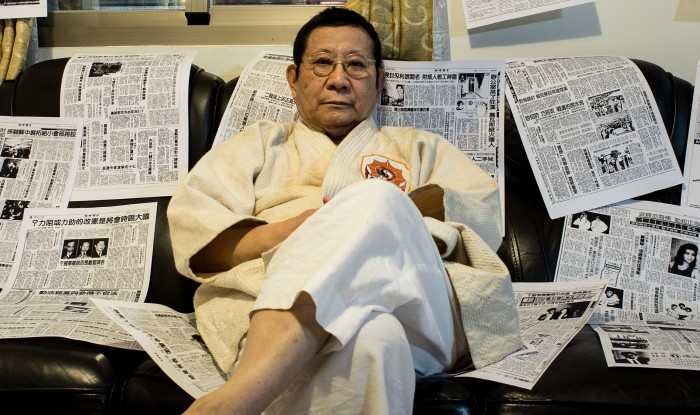
“Let’s talk about LIAO Tian-ding. His stories are endless…” In the 1970s and 1980s, everyone in Taiwan knew the voice of WU Le-tien. Born in Qiedongjiao, Tainan in 1947, he was a famous pirate radio show host known for telling the legend of LIAO Tian-ding. Director Adiong LU called him “a superstar to southern Taiwanese”. His show was a shared memory of early Taiwanese society.
WU Le-tien knows no fear in his life. He battled with the government for several times and demanded justice for Taiwanese people, just like the heroic LIAO Tian-ding. Perhaps his name has become less familiar to the younger generation, yet the marks he left in Taiwan’s history are still worth exploring. Based on his childhood memory and personal feelings, Adiong LU’s Once Upon a Time When Robin Hood Grew Old leads modern audience to put together the story of this legendary figure fading away from people’s memory. Below is an interview with the director.
Q: How did you get along with WU Le-tien? What were the happiest and most difficult parts during filming?
When I decided to film WU Le-tien, he had already disappeared for a while. I went to Chiayi and Yunlin to ask around, and nobody knew where he was. But they were all very excited that he was going to be the subject of my film. There were also some who thought I was out of my mind.
Eventually I got in touch with him on Facebook. I was lucky. He was about to have a comeback storytelling show at the underground shopping bazaar in Mengjia, Taipei. For only NT0, you can sit there and listen to his stories, and even have some peanut brittles. I got there and found all sorts of people. Interestingly, the one-armed man I found intriguing on the metro was there too. I even discovered he pretended to have only one arm. Can we call such person a trickster? He actually tried hard to survive. What I felt was that WU Le-tien offered a certain level of comfort to these dejected people.
It didn’t go well at the start of the filming. I was the storyteller and so was he. He had been in the media for years, having worked in broadcasting and film. A worldly-wise person like him knew all too well about what I was going after. He was then not as successful as he used to be, and who would want to be visually documented at the lower point of his life? So the most difficult part of the filming was to gain his trust.
In the first year WU was quite wary of me. I spent a long time bonding with him. In fact he needed listeners, and I was his only listener. Looking back, the happiest moments during the filming was when I sat shoulder to shoulder with him on the floor, smoking cigars and watching TV. I really enjoyed the time I spent with him.
Q: Do you have any expectation of how the audience will see WU Le-tien? How did you want to present him?
Actually when the filming first began, there were no preconception and no script. I just spent time with WU Le-tien in a natural way. When making documentaries, I’m not simply the observer; I even become my subjects, taking in all their emotions and conditions. This is also the most difficult part, having to digest all their feelings. So I think Once Upon a Time When Robin Hood Grew Old is more like my diary, which shows how I see WU Le-tien. In the three years of filming, I avoided being exposed to too much information about WU and deliberately did not read too many documents about him. I wanted to preserve my most original and purest feeling from my childhood.
To me, WU Le-tien has always been an idol, even though he is indeed not as vigorous as before. I have tried persuading him to release his sorrow, but he retained the stubbornness and strength of a generational hero. He would not easily surrender and admit his defeat. What I wanted to present was a graceful exit of the man I admire.
Q: Many people fall into the myth of searching for “truth” in documentary films. What are your thoughts on this? How do you see the truthfulness of WU Le-tien in Once Upon a Time When Robin Hood Grew Old?
I don’t think there are absolute truths in the world. After watching the film, a number of people suggested that I should have done some further verification. Actually, I did. But I decided not to even show the names and identities of all the interviewees in the film, because I think the truthfulness in what they said is not the most important. At the end of the film, we destroyed the documents about all his great achievements. I was going to check with him those newspapers I got from the archives one by one, but in the end I felt it was unnecessary. Maybe he had already forgotten about them.
As I got closer to my childhood hero, the connection I had and the time I spent with him were true. Being able to sincerely spend time with a person out of all the people in the world is what “truth” meant to me.
For more information about Once Upon a Time When Robin Hood Grew Old, please click here.
(Translated by TAN Chen-chih)
